#europe law
Text
"Tuesday’s [April 9, 2024] definition-shifting court ruling means nearly 50 governments must now contend with a new era of climate litigation.
Governments be warned: You must protect your citizens from climate change — it’s their human right.
The prescient message was laced throughout a dense ruling Tuesday from Europe’s top human rights court. The court’s conclusion? Humans have a right to safety from climate catastrophes that is rooted in their right to life, privacy and family.
The definition-shifting decision from the European Court of Human Rights means nearly 50 governments representing almost 700 million people will now have to contend with a new era of litigation from climate-stricken communities alleging inaction.
While the judgment itself doesn’t include any penalties — the case featured several women accusing Switzerland of failing to shield them from climate dangers — it does establish a potent precedent that people can use to sue governments in national courts.
The verdict will serve “as a blueprint for how to successfully sue your own government over climate failures,” said Ruth Delbaere, a legal specialist at Avaaz, a U.S.-based nonprofit that promotes climate activism...
Courting the courts on climate
The European Court of Human Rights was established in the decade following World War II but has grown in importance over the last generation. As the judicial arm of the Council of Europe, an international human rights organization, the court’s rulings are binding on the council’s 46 members, spanning all of Europe and numerous countries on its borders.
As a result, Tuesday’s [April 9, 2024] ruling will help elevate climate litigation from a country-by-country battle to one that stretches across continents.
Previously, climate activists had mostly found success in suing individual countries to force climate action.
A 2019 Dutch Supreme Court verdict forced the Netherlands to slash its greenhouse gas emissions by 25 percent, while in 2021 a French court ruled the government was responsible for environmental damage after it failed to meet greenhouse gas reduction goals. That same year, Germany’s Constitutional Court issued a sweeping judgment that the country’s 2019 climate law was partly “unconstitutional” because it put too much of the emissions-cutting burden on future generations.
Even in the U.S., young environmental activists won a local case last year against state agencies after arguing that the continued use of fossil fuels violated their right to a "clean and healthful environment."
But 2024 is shaping up to be a turning point for climate litigation, redefining who has a right to sue over climate issues, what arguments they can use, and whom they can target.
To start, experts overwhelmingly expect that Tuesday’s ruling will reverberate across future lawsuits — both in Europe and globally. The judgment even includes specifics about what steps governments must take to comply with their new climate-related human rights obligations. The list includes things like a concrete deadline to reach climate neutrality, a pathway to getting there, and evidence the country is actually on that path...
Concretely, the verdict could also affect the outcomes of six other high-profile climate lawsuits pending before the human rights court, including a Greenpeace-backed suit questioning whether Norway's decision to grant new oil and gas licenses complies with its carbon-cutting strategy.
An emerging legal strategy
In the coming months, other international bodies are also expected to issue their own rulings on the same thorny legal issues, which could further solidify the evolving trend.
The International Court of Justice, the International Tribunal for the Law of the Sea and the Inter-American Court of Human Rights all have similar cases working through the system.
"All these cases together will clarify the legal obligations of states to protect rights in the context of climate change — and will set the stage for decades to come," said Chowdhury, from the environmental law center."
-via Politico, April 9, 2024
#europe#human rights#legal system#international politics#climate change#climate emergency#climate hope#international law#netherlands#france#germany#united states#switzerland#good news#hope
1K notes
·
View notes
Photo
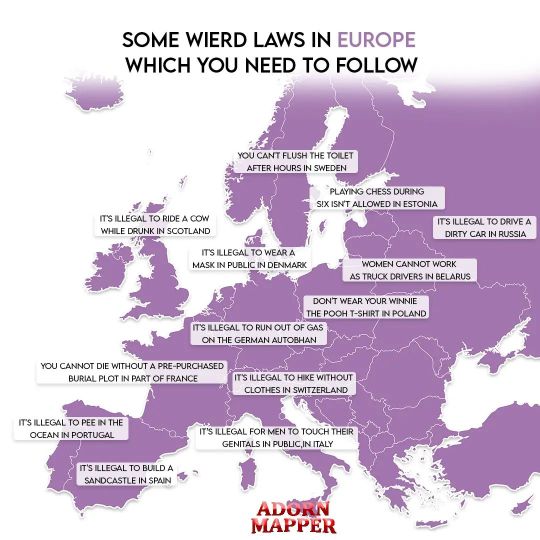
Weird laws in Europe.
by adorn_mapper
211 notes
·
View notes
Text


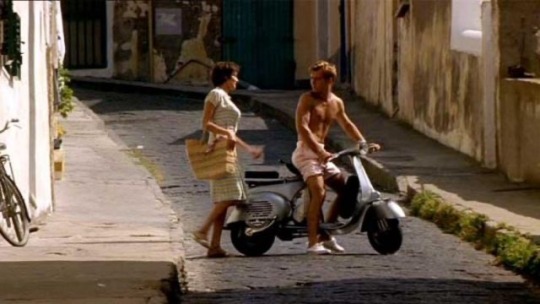

#the talented mr ripley#the talented mr. ripley#dickie greenleaf#tom ripley#jude law#matt damon#tweet#twitter#meme#funny#memes#film#cinema#europe#european#european lifestyle#european life#travel#wanderlust#escapism#fantasy#hilarious#screenshot#la vida dolce#italy#lifestyle#glamour#patricia highsmith#european food#europe aesthetic
812 notes
·
View notes
Text

#good news#nature#science#environmentalism#environment#animals#climate change#conservation#climate legislation#climate law#climate#climateaction#climate activism#global climate change#climate crisis#portuguese#portugal#europe#eco anxiety
284 notes
·
View notes
Text
In a landmark decision, the European Court of Human Rights (ECHR) has today ruled that climate change violates the right to respect for one’s private and family life.
The case was brought by an association of older Swiss women concerned about the impact of global warming on their health, who claim the Swiss government is not taking enough action.
The ECHR ruled by 16 judges to 1 that the KlimaSeniorinnen (Swiss Elders for Climate Protection) were subject to a violation of Article 8 as well as (unanimously) Article 6 - the right to a fair trial in their country.
“While we do not have all the details yet - this decision is historic!” writes Sébastien Duyck, senior attorney at the Center for International Environmmental Law. “The Court has found the petition admissible and finds a violation of the rights of the Klimaseniorinnen both on process and on the substance!”
Two other climate cases - brought by a former French mayor, and six Portuguese youth - were found to be inadmissible, however.
#solarpunk#solar punk#climate change#switzerland#inaction by government on climate change affects citizens welfare and human rights#legal case#law#europe
41 notes
·
View notes
Text

A protestor uses a tennis racket to return a tear gas canister during a demonstration to protest the French Government's proposed labor law reforms in Nantes, France (2016) photog. Stephane Mane
#protest#labor law#protester#france#paris#photography#nantes#stephane mane#reuters#demonstrators#urban#europe
72 notes
·
View notes
Note
For papal dispensations when Medieval nobles married cousins, as often happened, how did one go about getting them? It does seem a tad excessive that at one point anything closer than a seventh cousin technically needed a dispensation. Were there particular areas where people were more lapse on such close unions?
Great question!
Let’s start by clearing up a few common misconceptions. We should start by pointing out that dispensations were an innovation of the late High Middle Ages, as part of Innocent III’s campaign of papal supremacy. This wasn’t particularly popular, (in no small part because Innocent would not stop fucking with secular rulers in Iberia, the Holy Roman Empire, Sicily, Norway, France, Sweden, Bulgaria, and England) and the dispensation was part of that broader political effort.

Legally, dispensations emerged as an assertion that the Pope possessed the exclusive plenary power to issue exemptions from the law, rather than it being a concurrent authority shared with secular power, because as Innocent saw it, the Pope was a prince and “the prince is not bound by the laws.” This is why, despite Innocent III’s (IMO) largely unearned reputation (remember, this is the same dude responsible for the own goal of the Fourth Crusade, the moral abomination of the Albigensian Crusade, and quite a bit of anti-Semitic decrees in Fourth Lateran), even his successors had to agree that this was massively open to abuses and might lead to a Reformation or something down the line, leading to a series of reforms on down through the centuries.
Second, not all dispensations were papal. Bishops as well as Popes could issue dispensations, on marriage and other issues, but the Pope was kind of the court of final appeals for the whole process, so marriage dispensations of royals tended to get kicked upstairs for political and moneymaking reasons, but local noblemen could usually keep their cases local.
31 notes
·
View notes
Text

Transportation of the Ark of the Covenant Containing the Tablets of the Law (Detail from The Room of the Ark in the Palatine Gallery, Palazzo Pitti, Florence, Italy) by Luigi Ademollo
#ark of the covenant#art#luigi ademollo#frescoes#fresco#pitti palace#palazzo pitti#florence#italy#renaissance#biblical#bible#europe#european#david#jerusalem#israel#israelites#tabernacle#procession#religion#religious art#high priest#aromatic#incense#clouds#tablets of the law#tablets of stone#city#temple
33 notes
·
View notes
Text
Loki surveilling the skyline of New York from the top of Stark Tower and clocking that his favorite paired set of buildings are gone. sad
#everyone wants thor and loki to have visited earth a bunch of times and obviously they wouldn't be too invested in earth politics#but i think the concept of much time passing between visits should be taken advantage of#like what if one of them missed seeing the statue of liberty on their past 3 visits and now that's 'suddenly' a famous historic landmark#Loki like wow I sure hope that restaurant in the Soviet Union is still around!#and Natasha's head whips around so fast like you mean Russia or one of the surrounding countries that used to be part of the USSR#Loki: uhm. well. what's the difference#Natasha: here is a map of the countries does this help#Loki: it does not help but thank you for trying#Thor: what do you mean Rome is gone???? Rome was HUGE?????#Tony: well it's been a few centuries since then Europe is very different now#Thor: (visibly distressed) so the the sweet effeminate men enjoy the streets no more??#Tony: ...I don't keep track of foreign border laws about that#Thor shows up after 3 years and there's a new president and he's very confused through the entire meeting#brodinsons being so detached from the political scene but being so used to realm politics they come to correct conclusions about things#even though the timeline and how long things stay the same on midgard still messes with them#Loki: at least Egypt is still around#Thor: China also#Brodinsons visiting New Zealand(Aotearoa)/Australia/various British mandate islands before the British formally showed up#returning 2 centuries later and 'the gene pool has altered drastically' 'must've been a war'#well it's either that or since Asgard seems spared of colorism they treat all humans as the same and don't notice. which might be worse#on the colonisation and liberation side of things
23 notes
·
View notes
Text
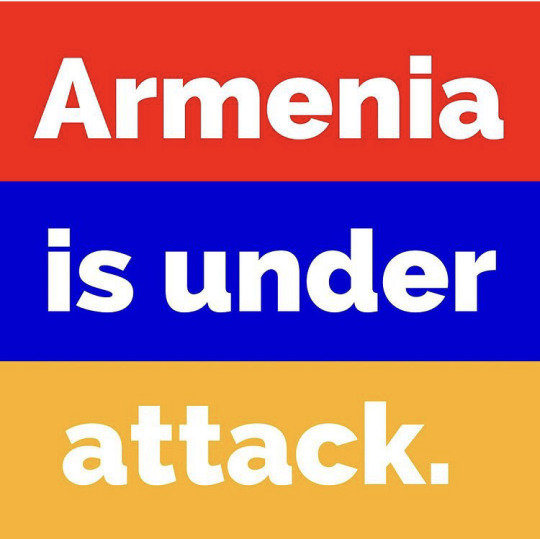
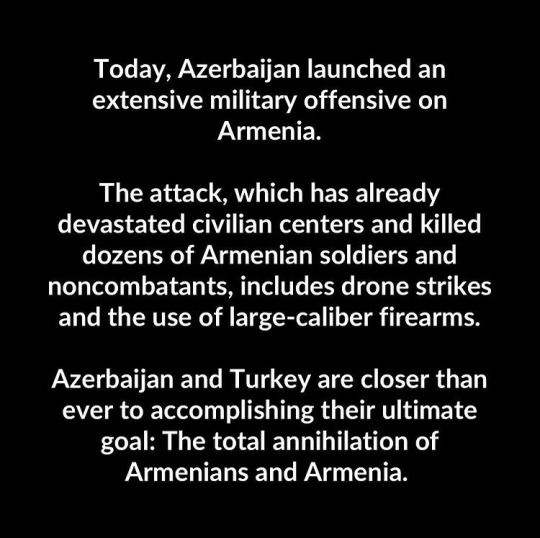
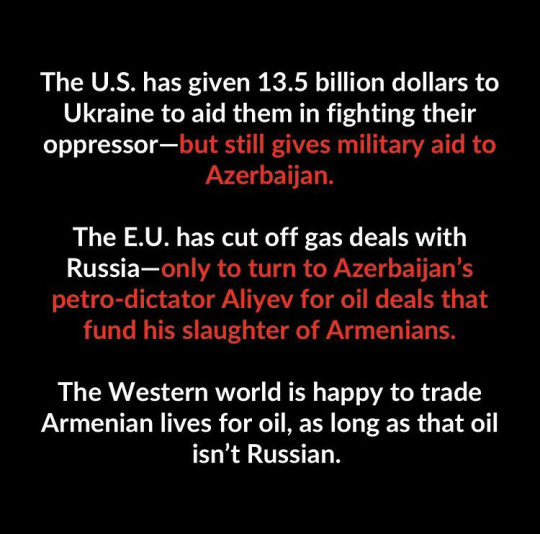


A day past the launching of the attack and by September 14th we have 105 soldier and civilian deaths confirmed already.
MOST IMPORTANT MENTIONED ORGANIZATIONS
Kooyrigs
Armenian Wounded Heroes Fund
source. columbiaarmenians
#important#signal boost#boost#armenia#history#uk politics#british politics#war#lawblr#law#stop azerbaijani aggression#politics#international relations#europe#current events#news#world news#help armenia#queen elizabeth#british royal family#kate middleton#prince william#iran#social justice#halloween
688 notes
·
View notes
Text
An illegal toxic dump site in Croatia, the theft of water from a major aquifer in southern Spain, illegal trading of ozone-depleting refrigerants in France: This is just a sampling of the environmental crimes that European countries are struggling to stop. The lack of accountability for these acts stems in part from the European Union’s legal code, which experts say is riddled with vague definitions and gaps in enforcement. That’s about to change.
Last week, EU lawmakers voted in a new directive that criminalizes cases of environmental damage “comparable to ecocide,” a term broadly defined as the severe, widespread, and long-term destruction of the natural world. Advocates called the move “revolutionary,” both because it sets strict penalties for violators, including up to a decade in jail, and because it marks the first time that an international body has created a legal pathway for the prosecution of ecocide.
“This decision marks the end of impunity for environmental criminals and could usher in a new age of environmental litigation in Europe,” wrote Marie Toussaint, a French lawyer and EU parliamentarian for the Greens/European Free Alliance group, on X...
The new directive uses the term “ecocide” in its preamble, but does not criminalize the act by laying out a legal definition (the most widely accepted definition of ecocide was developed by an international panel of experts in 2021). Instead, it works by providing a list of “qualified offenses,” or crimes that fall within its purview. These include pollution from ships, the introduction of invasive species, and ozone depletion...
The new law holds people liable for environmental destruction if they acted with knowledge of the damage their actions would cause. This aspect of the law is important, experts said, because it means that a permit is no longer enough for a company to avoid culpability.
“If new information shows that behavior is causing irreversible damage to health and nature – you will have to stop,” a member of the European Parliament from the Netherlands, Antonius Manders, told Euronews.
Advocates like Mehta hope that the EU’s move will have influence beyond Europe’s borders. The principal goal of the Stop Ecocide campaign is for the International Criminal Court to designate ecocide as the fifth international crime that it prosecutes, after crimes against humanity, war crimes, crimes of aggression, and genocide. At the moment, environmental destruction can only be prosecuted as a war crime at the ICC, and limitations in the law make this extremely difficult to do...
Kate Mackintosh, the executive director of the Netherlands-based UCLA Law Promise Institute Europe, told Grist that the ICC is unlikely to adopt an ecocide law if other countries do not do so first.
“It’s not something you can just pull out of thin air,” she said, adding that any international legal doctrine has to have a precedent on the national level. “That’s the way states are going to accept it.”
The EU’s 27 member states will have two years to adapt the new legislation into their penal codes. Afterwards, their implementation must be reviewed and updated at least once every five years using a “risk-analysis based approach,” to account for advancements in experts’ understanding of what might constitute an environmental crime. Mehta said that despite its omission of some important offenses, the law sets an important example for other countries. Several days before the EU vote, Belgium adapted its criminal code to include the directive, making it the first country in Europe to recognize ecocide as a crime.
The ruling “shows leadership and compassion,” Mehta said. “It will establish a clear moral as well as legal ‘red line’, creating an essential steer for European industry leaders and policy-makers going forward.”
-via Grist, March 6, 2024
#climate change#climate crisis#climate catastrophe#climate action#eu#european union#icc#international criminal court#belgium#europe#environment#environmental law#environmental news#ecocide#good news#hope#hope posting
723 notes
·
View notes
Photo

Is it legal to destroy your own flag?
by thebluemaps
199 notes
·
View notes
Text

#XIX Europe#ethnically clean state ideology#Presence of gypsies and juish populations in Europe hampers the ethnically pure state ideology (XIX colonialisms)#hegemonic hate against juish#pogrom#Sionism created in Vienne´s Bourgoisie#theodor herzl#1897#“We will create an ethnically clean colonial juish state!”#BUND: juish revolutionary workers against sionism#religious juish against sionism#Balfour#christian sionist#proud of the declaration: juish out!#1905: speech and law against revolutionary juish#1917: Declaration#1933: Havaara agreement between Nazis and Sionists#60 000 juish out of Germany#Palestine#sionist institutions created before WWII !#1901: KKL juish national funds#1922: INSTADRUM sindicate#1937: MEKOROT#1921: SOLEBONE#APOALIM#Palestinian pay for European Antisemitism#Europe never opened its borders and states to juish after WWII#Antisemite Sionists´s dollars#today 40 milion of Christian Sionists in US#colonialism
14 notes
·
View notes
Text
europe is so interesting. they treat me like a cute kid, backpacking across europe at age 21. the next second they ask me why i'm responsible for gun violence in the united states.
#it's just so irritating#after my first night out in barcelona i introduced myself as peruvian exclusively#bc fjweiaofjreaogehw#they care sm abt american ex-pats gentrifying lisbon#(which is a problem)#but they don't care about literally any of the other clear as fucking day problems in their continent#i introduced myself as american#(texan moving to californian)#and then asked for my opinions on anti-queer laws; pro-gun laws; and why i still 'support' the country#i just happen to live therefjewiaofjreioag#this one parisian thought that we never learned abt the renaissance like#how much do u wanna bet they never learned abt any usa renaissances (harlem; french language rebirth in louisiana; etc)#cw: gun violence mention#gun#gun mention#so at least now i know i can't live in europe long-term#dash rambles#tonight is a night to think abt my spain speed-run#and then move on to portugal where hopefully they understand me#if it weren't for the tourism (english-speakers) i would've been in trouble in barcelona bc catalan doesn't sound as spanish-y as it reads
59 notes
·
View notes
